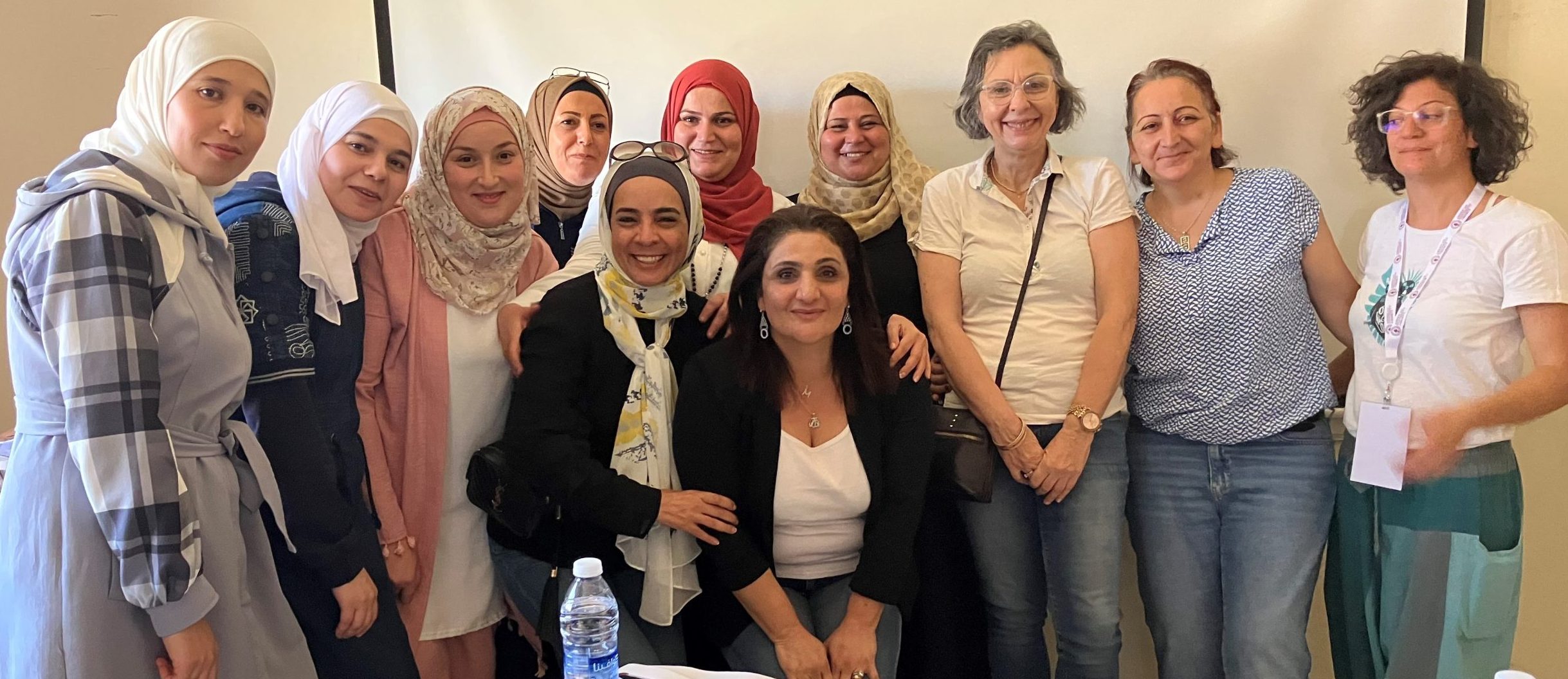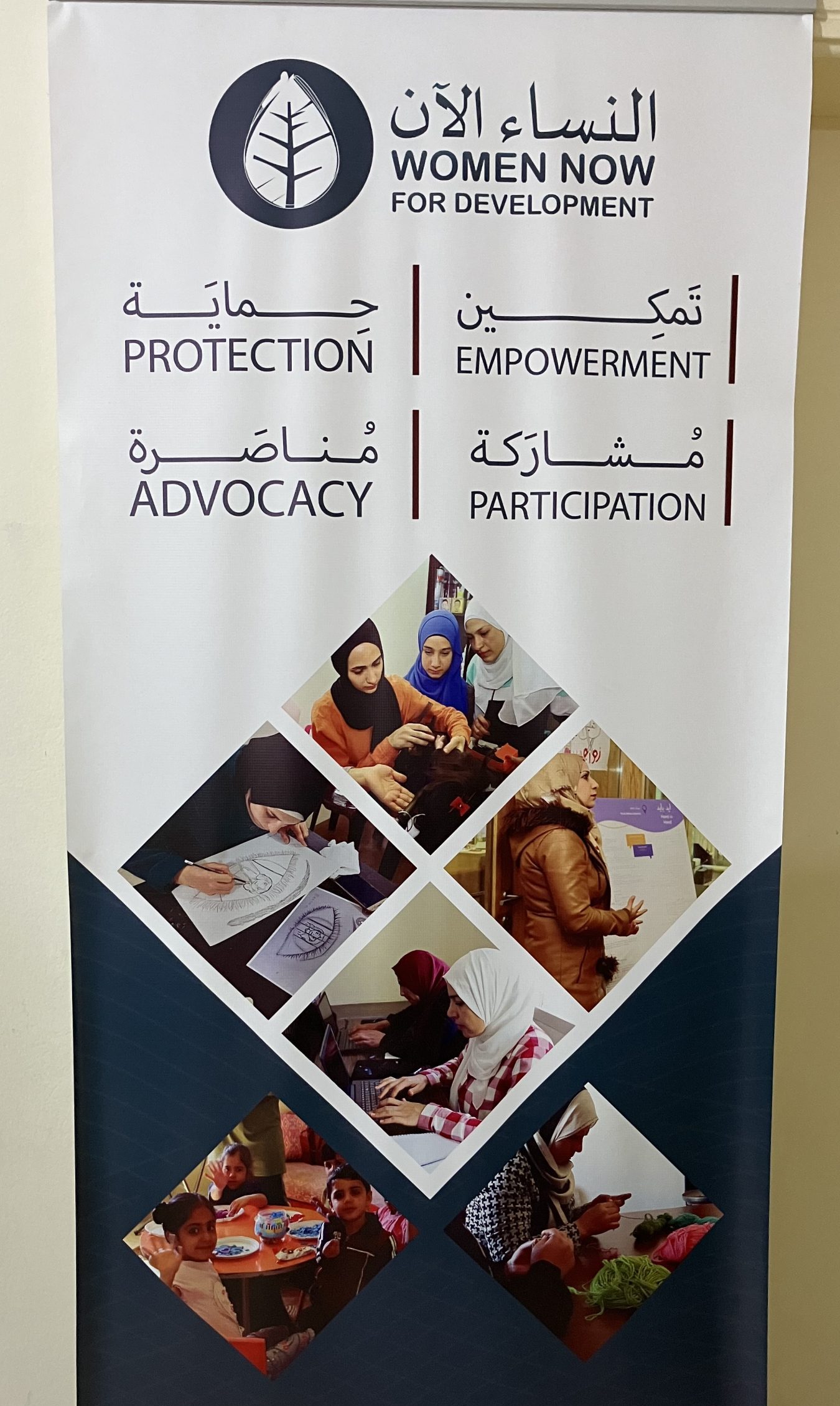
The ladies of the Working Women group, staff from the Women Now centre and AUB & LSTM staff
Women, mothers, wives, refugees, health workers, activists: the roles of close-to-community health workers in Lebanon
8 November 2023
A highlight of ReBUILD’s recent visit to the Beqaa Valley in Lebanon was our meeting with a group of local close-to-community health workers in Majdal Anjar. The women had all taken part in ReBUILD’s study into the gendered impact of COVID-19 on health workers in the area and are now part of a follow-up study, Close-to-community providers addressing gender norms and power dynamics: participatory action research in fragile and shock-prone settings. We were treated to a presentation about how the women have mobilised themselves to form a support group – Working Women – and in the process we were given a small insight into their lives as women, mothers, wives, refugees, health workers and activists.
Women Now
Our meeting was hosted by Women Now for Development [opens new tab] – a local NGO which is working to advance local women’s employment prospects and wellbeing through sessions on developing transferable skills, psychological support and leisure opportunities. Topics covered in sessions include technical and computer skills, Arabic and English languages, manual skills including home crafts, health education, psychology and first aid. The group’s focus is the area’s most vulnerable and marginalised individuals, eg widowed women, those living alone, and those looking after disabled family members, but everyone is welcome. Maryam Abdul Wahed of Women Now (seated centre in the top image) described how the centre is having a big impact on local women’s lives, and how every day more are asking to take part in training.
A burdened sisterhood
Maryam was keen to emphasise that the centre is for both Syrian and Lebanese women. Both groups live in a conservative, patriarchal environment and face many of the same challenges. Many do not have any formal education, cannot share in the community’s political life, and even need a husband or father’s permission to attend the centre, being escorted to and from meetings. Domestic violence is not uncommon in both communities. Women Now works to create a safe, welcoming but not anti-male space for the visiting women, aiming to be supportive of the women’s families as well as the women themselves.
Maryam firmly believes that change is possible, that every woman can be a leader, and can go from being silenced to having a presence in a more equal society. Maryam tries to make the women feel special, to believe that they can do something with their lives. So far Women Now has supported dozens of initiatives, some of which have become standalone entities. One of those initiatives is Working Women.
Working Women
As part of the ReBUILD follow-on study eight Syrian informal health workers gathered to talk about the specific challenges they face, to rate them and then to come up with solutions to the issues (there’s a blog post on this process here). The double burden of home and work was the chosen target. They approached Women Now to help develop ideas and after several meetings founded Working Women – a participatory community which aims to support and advocate for working women in Majdal Anjar and beyond.
When the women disseminated their workshop findings and plans to other women in their community, they realised that their problems were common. One member said that the response from other women made them feel like they had been chosen to do something for their community, that this was important.
Next, a community-wide recruitment survey was initiated by the group leading to a remarkable 210 members who also endure the ‘double burden’ of home and work responsibilities, and a core of 15 women who form the committee (the group has written byelaws). Following a training needs assessment with Maryam, the group identified leadership, motivation, financial literacy, proposal writing, project management, conflict resolution and procurement as training topics, alongside ‘training the trainers’ sessions to spread the benefits further. Their ultimate aim is to help women overcome the challenges they face through practical problem solving.
Ola El-Jundi (second from right) is now the coordinator of the group, a Lebanese woman who has brought training sessions along with a focus for the group. She explained that there are multiple, complex layers of vulnerability among women including their status in society, their roles within their households, and the impact of the collapsing Lebanese economy. In such a challenging environment individuals develop their own survival strategies but to thrive people need to think as a community. This includes raising the capacities of women and being responsive to the changing needs of the population. Ola says that a focus on women’s rights is central to that objective.
Barriers to change
The Working Women members have high expectations but know that change will not happen overnight. A major issue is their lack of status. Syrians are classed as displaced people in Lebanon, not refugees (Lebanon has not ratified the 1951 Refugee Convention) and therefore cannot work, despite being qualified in Syria and taking Lebanese equivalence courses. Instead, Syrian people ‘work’ informally and get ‘paid expenses’ which are not enough to live on. However, if they are stopped at one of the growing numbers of military check points or arrested during one of the ever-increasing raids on a camp or health facility they may be sent back to Syria, where they may be pressed into the army if male, disappeared or killed. The situation became such that earlier this year, and despite the progress the group had made, the women chose to go home after ‘work’ rather than meet and risk being stopped, relying on WhatsApp instead.
One member described how difficult it is to find time in the day to attend meetings, especially for the women who travel to Majdal Anjar. Winter is especially hard, with fewer daylight hours, bad weather and less opportunity to meet. Again, social media comes into its own in such situations.
Day care is a problem for everyone. The team has found a space for a creche but without funds to refurbish the space and recruit a teacher it remains unopened. The women were anxious to stress that this would not be a for-profit venture – just a service for the good of the women in their group.
Progress may stutter but what cannot be denied is the women’s determination. They came to that first meeting as women, mothers, wives, refugees and health workers. They now also view themselves as activists. They have grown in confidence, developed a plan for their group, and see Working Women as the first step to improving the lot of all women in Majdal Anjar. However, this is not just about the women. They are also doing this for their families and their community, understanding that by helping to alleviate their own double burden of home and work pressures there will be positive impacts on family life and their healthcare work within the wider community.
Further information
- Study information: These women were part of two ReBUILD studies into the gendered impact of COVID-19 on health workers in the area and close-to-community providers addressing gender norms and power dynamics – more on both those studies and the women involved here
- Blog post: Read an overview of our visit to Majdal Anjar here.
- Blog post: on the workshops that led to the formation of Working Women.
- Blog post: An interview with a member of the Working Women Group
